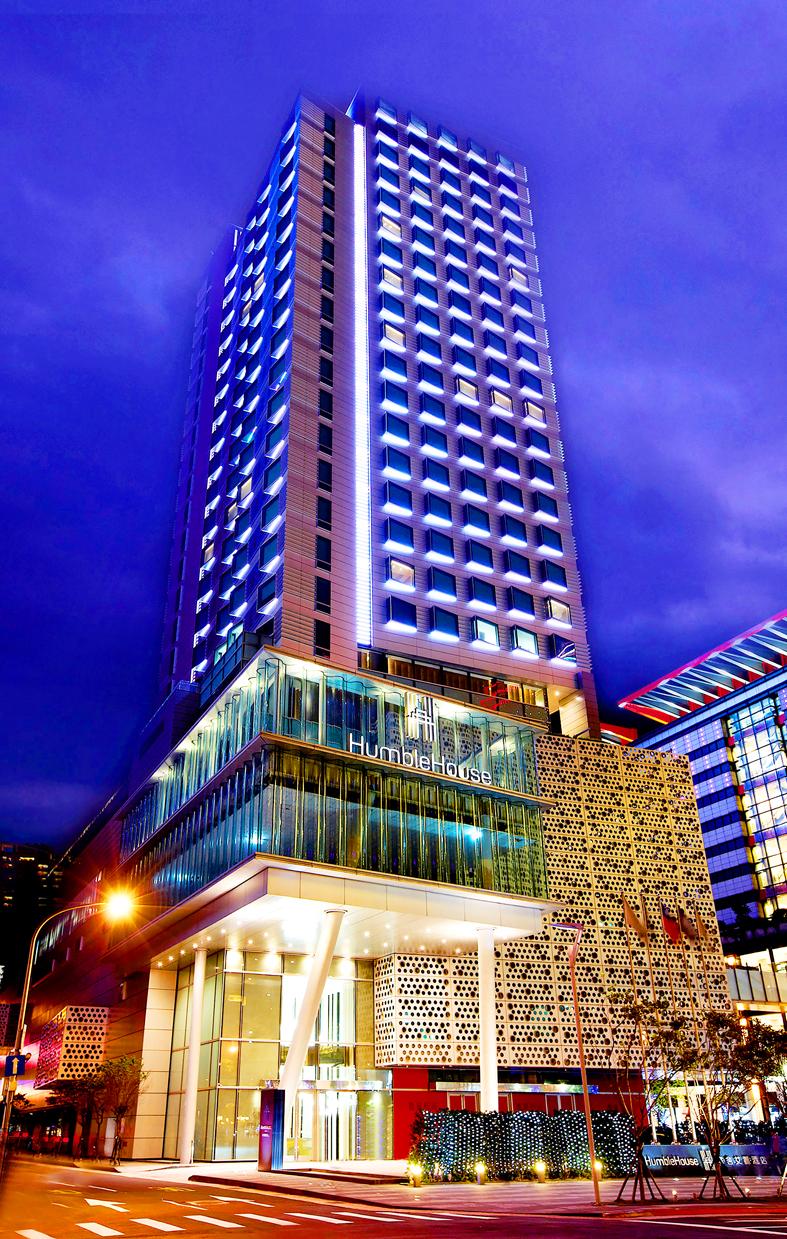Luxury hotel operator My Humble House Hospitality Management Consulting Co (寒舍餐旅) yesterday said that the solid headway that its business has gained this quarter could improve further next year, even though losses linger from last quarter.
Consolidated revenue for the third quarter stood at NT$320 million (US$11.51 million), a 22.68 percent decline from three months earlier and a 57.42 percent fall from a year earlier, the company told an online investors’ conference.
Net losses last quarter were NT$243 million, down 6.39 percent quarter-on-quarter, but up 699.96 percent year-on-year, the company said.

Photo courtesy of Humble House Taipei via CNA
Losses per share last quarter were NT$2.18, compared with losses per share of NT$2.33 the previous quarter, company data showed.
Revenue generated from restaurants, which accounted for 70 percent of the company’s total sales last quarter, has recouped business momentum this quarter, thanks to the government’s successful control of a local COVID-19 outbreak, it said.
Guest room revenue, which made up 30 percent of total sales, remains under pressure and the company is shifting its focus to urban tourism, as lingering border controls stifle business travel, it added.
To that end, the company said that its hotels — such as Le Meridien Taipei (台北寒舍艾美酒店), Humble House Taipei (寒舍艾麗) and Sheraton Grand Taipei Hotel (台北喜來登大飯店) — would target local tourists and highlight accommodation packages that offer meals.
Its buffet restaurants, the Latest Recipe (探索廚房) and Kitchen 12 (十二廚), have almost solid reservations toward the end of the year, while occupancy at its hot spring resort in Yilan County, the Mu Jiaosi Hotel (礁溪寒沐), has recovered to 80 percent, My Humble House said.
The company is ready to take advantage of “travel bubbles” with Asian neighbors next year, once the government gives the authorization, it added.
The company said that in the first quarter of next year, it would introduce a new property in Taipei’s Zhongshan District (中山) under its own brand, which would boost its revenue.

SELL-OFF: Investors expect tariff-driven volatility as the local boarse reopens today, while analysts say government support and solid fundamentals would steady sentiment Local investors are bracing for a sharp market downturn today as the nation’s financial markets resume trading following a two-day closure for national holidays before the weekend, with sentiment rattled by US President Donald Trump’s sweeping tariff announcement. Trump’s unveiling of new “reciprocal tariffs” on Wednesday triggered a sell-off in global markets, with the FTSE Taiwan Index Futures — a benchmark for Taiwanese equities traded in Singapore — tumbling 9.2 percent over the past two sessions. Meanwhile, the American depositary receipts (ADRs) of Taiwan Semiconductor Manufacturing Co (TSMC, 台積電), the most heavily weighted stock on the TAIEX, plunged 13.8 percent in

A wave of stop-loss selling and panic selling hit Taiwan's stock market at its opening today, with the weighted index plunging 2,086 points — a drop of more than 9.7 percent — marking the largest intraday point and percentage loss on record. The index bottomed out at 19,212.02, while futures were locked limit-down, with more than 1,000 stocks hitting their daily drop limit. Three heavyweight stocks — Taiwan Semiconductor Manufacturing Co (TSMC, 台積電), Hon Hai Precision Industry Co (Foxconn, 鴻海精密) and MediaTek (聯發科) — hit their limit-down prices as soon as the market opened, falling to NT$848 (US$25.54), NT$138.5 and NT$1,295 respectively. TSMC's

ASML Holding NV, the sole producer of the most advanced machines used in semiconductor manufacturing, said geopolitical tensions are harming innovation a day after US President Donald Trump levied massive tariffs that promise to disrupt trade flows across the entire world. “Our industry has been built basically on the ability of people to work together, to innovate together,” ASML chief executive officer Christophe Fouquet said in a recorded message at a Thursday industry event in the Netherlands. Export controls and increasing geopolitical tensions challenge that collaboration, he said, without specifically addressing the new US tariffs. Tech executives in the EU, which is

In a small town in Paraguay, a showdown is brewing between traditional producers of yerba mate, a bitter herbal tea popular across South America, and miners of a shinier treasure: gold. A rush for the precious metal is pitting mate growers and indigenous groups against the expanding operations of small-scale miners who, until recently, were their neighbors, not nemeses. “They [the miners] have destroyed everything... The canals, springs, swamps,” said Vidal Britez, president of the Yerba Mate Producers’ Association of the town of Paso Yobai, about 210km east of capital Asuncion. “You can see the pollution from the dead fish.